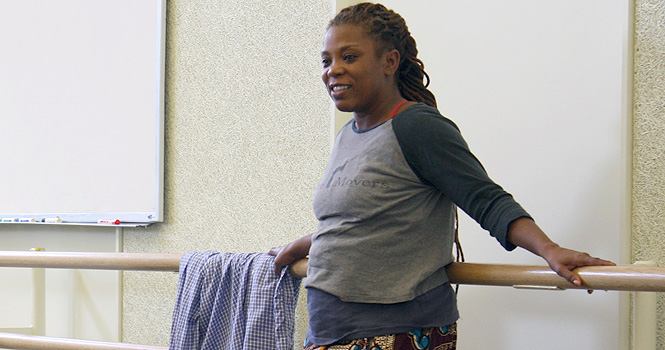West African dance comes to Kent State
Robin Gee, associate professor at the University of North Carolina-Greensboro, accompanied with Atiba Rorie and Assane Mbaye educate dance student on the West African drums they’ll dance to in class, March 7. Photo by Chelsae Ketchum.
March 14, 2012
Robin Gee signals two drummers to begin beating their drums. Following the tempo, she dances around, leading a group of students to follow her movements.
Gee is bringing a variety of traditional West African dance to life in Kent dance studios this week as a guest professor for master classes.
Gee, an associate professor of dance at University of North Carolina-Greensboro, earned an MFA in Dance Choreography and Performance from Sarah Lawrence College.
“The area, the language and the ethnicity informs dance. Each ethnic group has its own language and that will be supported by music,” Gee said. “Some will be similar to what we’re doing, but some will be completely different. Within the region they’re multiple ethnic groups that have different rituals and practices that are reflected in the dance.”
Gee said it’s important to understand that for every dance there is a specific piece of music.
“If I say this is what I want to do, they know exactly what music to play,” Gee said. “They’re not just jamming. Often beforehand we have to sit and get the music together before I even start teaching.”
Gee said there is a real specificity to the dancing, it’s not just random movement.
“There is a specific technique that goes into everything we do,” Gee said. “We study and practice the same way others do in dance.”
However, Gee said not all movements have specific meaning.
“You can have dances that illustrate an action, such as harvesting, but sometimes the dances are not so literal,” Gee said. “It’s more about the context that gives the movement meaning, not the other way around.”
Atiba Rorie, one of Gee’s accompanying drummers, said music is vital to African life.
“History is kept, translated, spoken about and talked about through music,” Rorie said. “Through music, people know what happened thousands years ago because there’s a song about it. For dance, I think music serves a very important purpose of creating a foundation.”
“Papa” Assane M’Baye, the other accompanying drummer from Cleveland, compared the relationship between West African dance and music to a husband and wife.
“They’re close,” M’Baye said. “If you don’t have the music you’re not going to dance. You can’t have one without the other.”
Gee said although West African dance is unique from classes normally taught at Kent State, there are similarities in the way the classes are structured.
“It’s structured very much like a jazz class or a modern class,” Gee said. “The language is different because the language of the movement and the music is different.”
Gee said one important distinction in African dance is that there is no counting.
“There are parts in the music that inform the dancers when to transition or when to stop,” Gee said. “That lack of structure makes it a different experience for the dancer”
Lauryn Fougerousse, senior psychology major and a dance minor, said the music sets African dance apart from other forms.
“Normally, in other dance classes, you are on the beat,” Fougerousse said. “With this it’s not the same, it’s not on the beat. It changes through the whole thing. They play a ‘break,’ which means to start, change or stop. It’s kind of like your five, six, seven, eight in a normal dance class.”
Stacey Ubelhart, junior dual dance major, said dancers needed to learn background information to understand the dance form.
“We learned a lot about how the music relates to the movement we do,” Ubelhart said. “In the African culture they do a lot of things to cue in the movement.
Learning the dance form was more visual than other classes for Ubelhart.
“In a usual warm up, they go through the combination, they put it together and then you do it to music,” Ubelhart said. “For this, she starts the music and you follow.”
A class from 9:55 to 10:35 Thursday will be open to dance students of all levels.
Contact Megan Confer at [email protected].












